trauma has the power to disrupt the balance of our body’s biochemistry.
this can affect our hormone regulation, memory, immune system and more.
as we navigate our way through our healing journeys, it is important we provide our body with nutrition to support our recovery.
there is a growing in scientific research, highlighting the direct influence diet and nutrition can have on our mental wellbeing.
specific nutrients have been shown to help build our body’s resilience, regulate stress responses and enhance brain function.
how does nutrition affect mental health
our diet plays a crucial role with positively impacting our mental health and recovery from trauma.
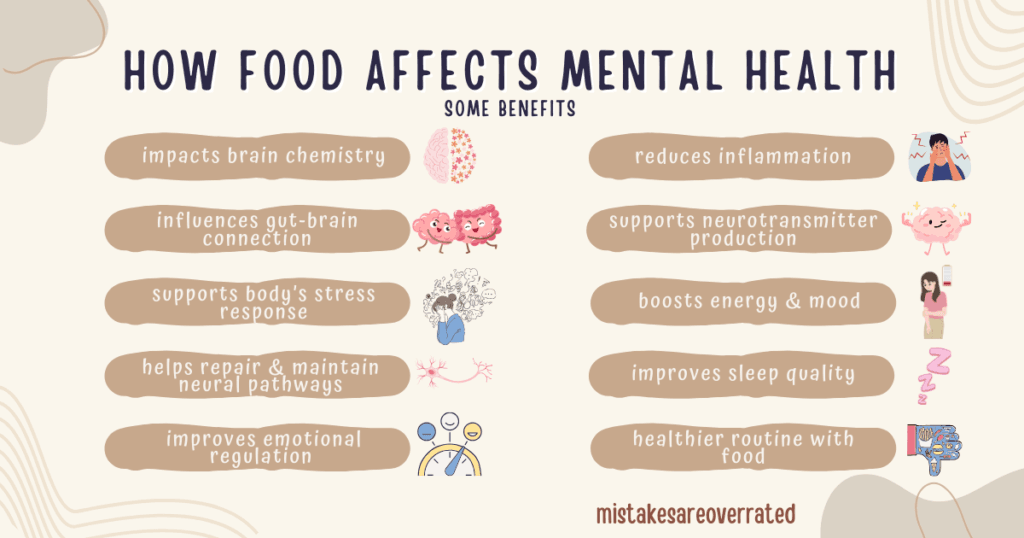
- impacts our brain chemistry
- influences our gut-brain connection
- supports our body’s stress response
- helps repair and maintain our neural pathways
- improves our emotional regulation
- reduces inflammation
- supports our neurotransmitter production
- boosts our energy and mood
- improves our sleep quality
- creates a healthier routine with food
on the other hand, a poor diet can actually intensify symptoms of trauma, such as anxiety, foggy-headed, fatigue, depression, ect.
lets get into the 21 nutritious foods we can eat to enhance our mental resilience, whilst promoting our trauma healing journeys.
trauma healing diet – 21 foods to promote healing
this is not the list of foods you see in every article with “vegetables, fruits, meat, ect”.
i am sharing with you the foods i eat that positively impacted my mental health, enjoyment in life, energy levels and brain activity.
please note that these food recommendations are purely from the changes i noticed in my personal mental health and healing from my diet.
the effectiveness of these food remedies can vary from each person, as we are all unique and our bodies are different.
please do your own research and consult a professional or health care provider before you try them.
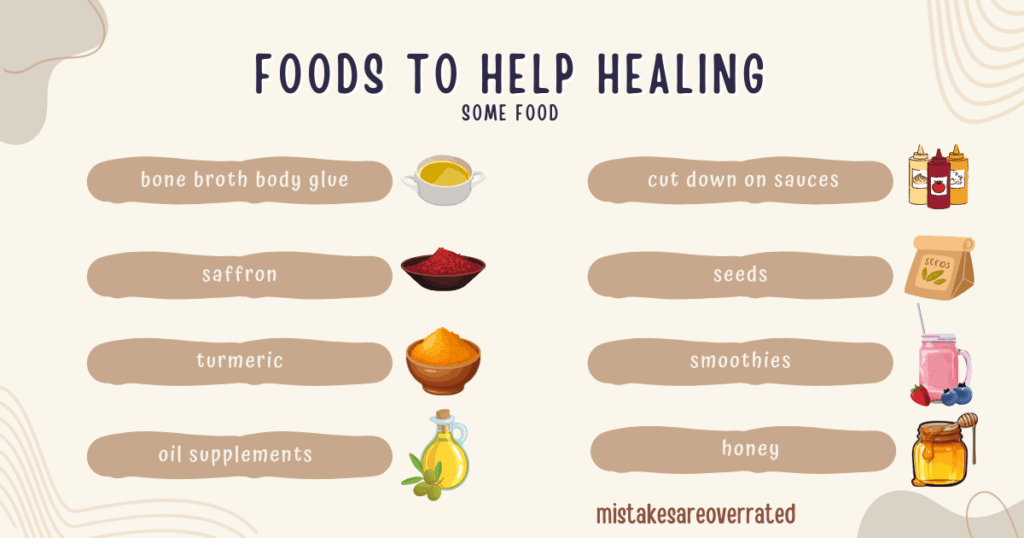
bone broth body glue
bone broth, specifically the bone broth body glue concentrate, is rich in amino acids, minerals, collagen and protein.
it can help support a healthy stress response, promote relaxation, improve mental function and reduce inflammation.
please look at the ingredients before buying. try to make sure it is 100% grass fed meat that is free from hormones and antibiotics.
how to use it? a base for soups and stews, substitute it for water when cooking rice and pasta, or if you are brave you can drink it warm.
saffron
saffron, saffron, saffron. it is ever so powerful.
this is not just a beautifully vibrant spice from a flower – it is actually shown to have antidepressant effects.
for centuries saffron has been used for medicinal purposes, as it can help increase our serotonin levels and help reduce inflammation.
it can be helpful in uplifting our mood, improving our emotional regulation and reducing symptoms of mild to moderate depression and anxiety.
how to use it? add it to rice, in soups and stews, have it as a tea, or you can infuse it into sauces and baked goods.
turmeric
i am so happy turmeric is becoming more spoken about, because i truly believe it is one of the most powerful anti-inflammatory foods.
turmeric root contains a compound called curcumin, which is known for its anti inflammatory and antioxidant properties.
how to use it? you can add it into literally everything (well i sure do!) roasted veggies, soups, coffee, on my eggs, baked goods, curries, salads
★ quick tip – combine black pepper with turmeric, as black pepper can help our body absorb the beneficial compounds in turmeric.
oil supplements
did you know that canola oil was originally used as a lubricant for machinery, yet now it is one of the most popular cooking oils?
did you know that canola is sometimes used by farmers to fatten their cattle up?
when i heard these things i said ‘no thankyou’, and have never used it since.
apricot kernel oil, hemp seed oil, butter (you can make your own from just whipping cream), ghee (this is high in fat so use small amount).
also, coconut oil can reduce inflammation, help regulate of hormones, provide quick energy to the brain and can improve mood!
cut down on sauces
many store bought sauces are considered to be ultra processed, due to the added sugar, lack of whole ingredients and artificial additives.
i suggest making homemade sauces, or shopping around for options that have fewer artificial ingredients.
(i was actually shocked with how simple some sauces are to make – plus they taste alot better in my opinion)
adding seeds to cooking
these include flax seeds, sesame seeds, hemp seeds, black seeds, pumpkin seeds, ect.
i began adding seeds to almost everything i cooked and i believe it supported my healing and improved my mental health.
seeds have such a rich nutritional profile, as they include essential minerals, vitamins, antioxidants, healthy fats, and protein.
how to use it? add to salads, on breakfast (i sprinkle on my eggs and avo), in smoothies, mix into yogurt and porridge, in stirfrys, baked goods, ect
smoothies
you will not only save money, have control of the ingredients and have a yummy drink, but you can also help support your mental health recovery.
making smoothies is one of my favourite things because they are so versatile.
create different flavours, textures and add new ingredients depending on what our bodies need that day.
goji berries, blueberries, strawberries, and blackberries are all excellent fruits to add into smoothies as they are rich in antioxidants.
they been shown to help reduce inflammation and support our brain health, (mood regulation and memory).
you can add seeds and nuts, turmeric, chai seeds, coconut water, greek yogurt, fruits, spinach, avocado, bone broth, ginger – all the good stuff!
honey
try look for raw, unpasteurised honey and substitute it for sweetener or white sugar.
honey has been known to have natural antibacterial effects, antioxidants, anti inflammatory effects, and it can support our immune health.
it can also help reduce stress and give us a natural energy boost, which can both support us on our healing journeys.
how to use it? in coffee, tea or smoothies, on toast or porridge, mix it into yogurt or in baked goods (like bagels or bread), ect
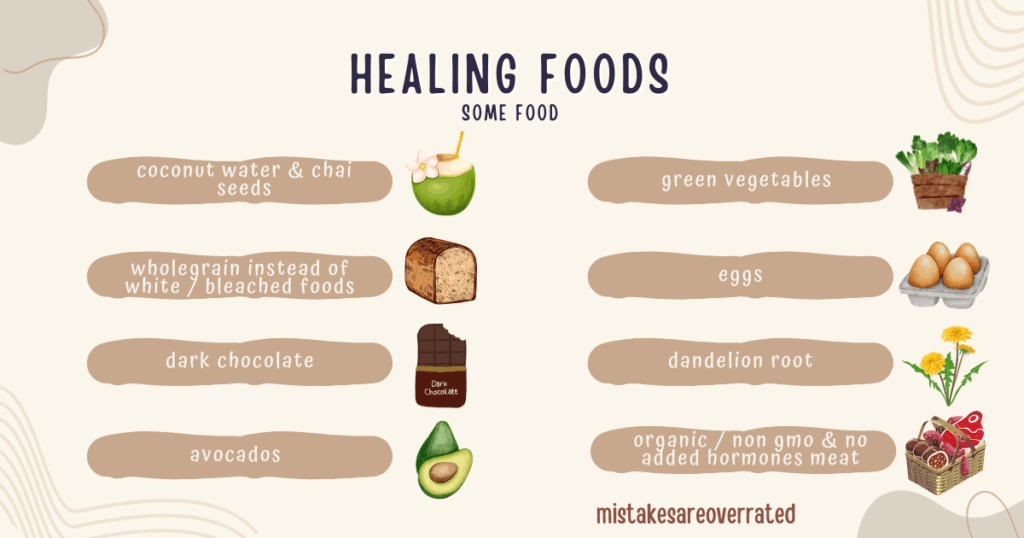
coconut water and chai seeds
this is natures gatorade.
after my sports games, training or exercise, i drink coconut water and chai seeds (or put them in my smoothie), to stay hydrated.
mixing coconut water and chia seeds provides us with essential electrolytes, hydration for the body, and reduces inflammation.
it also offers antioxidants that promote our brain function, tissue repair, gut health and emotional balance, all important for our trauma recovery.
wholegrain instead of white / bleached foods
by swapping out white foods for wholegrain, we’re able to consume more essential nutrients, fibre, and vitamins, (plus white foods are generally ultra processed)
wholegrain supports our trauma healing by providing us sustained energy, regulating our mood, gut health, and stabilises blood sugar levels.
what changes? oats, pasta, bread, wraps, bagels, cereal, ect
dark chocolate
this is perfect news for us sweet tooth peeps.
cacao can help support brain function, improve blood flow to the brain and enhance neuroplasticity.
i began creating my own treats with dark chocolate. 70% cocoa or higher, (just be mindful of the sugar content).
dark chocolate can promote our wellbeing as it has been shown to increase the release of endorphins and serotonin.
trauma and stress can negatively affect our mind, but cacao can help us restore mental clarity, offer us emotional comfort and support our healing.
★ check the ingredients for added sugar or unwanted additives and be weary that dark chocolate is still high in calories and sugar.
avocados
an amino acid found in avocados can help produce serotonin and balance hormones, whilst the antioxidants can help reduce inflammation.
avocados are a great source of healthy fats, and are known to help support brain health, mood regulation and reduce feelings of stress.
these are all great benefits when we are healing from trauma, as trauma can increase our stress levels, inflammation in our body and our mood.
how to use it? on toast, as a side, on it’s own, in a smoothie, dip, salsa, brownies, on tacos, in salad, ect.
vegetables, specifically green vegetables
green vegetables can support our trauma healing as they contain essential vitamins, minerals, and antioxidants.
they can help reduce inflammation, promote detoxification, support brain function, improve mood and our overall mental wellbeing.
i have minimum two leafy green vegetables per day, and since incorporating these consistently into my diet, i have felt so much better.
what are they? spinach, asparagus, kale, bok choy, broccoli, broccolini, green beans, cabbage, ect.
eggs
eggs are considered a high quality protein, as they contain all of the nine essential amino acids.
they may also help our memory, muscle repair, regulate our mood, sleep, behaviour and emotional stability.
how to use it? omelettes, scrambled, in salad, on toast, with steak, muffins or quiche, poached, boiled, in noodles, pasta or on the side.
dandelion root
dandelion root can support our trauma recovery by detoxifying the liver, improving digestion, reducing inflammation, and promoting gut health.
dandelion root may also help support the secretion of insulin, flush toxins from the body and boost our immune system.
how to use it? tea, coffee substitute, roasting it with veggies, in salad, cooking with it, ect.
(i personally just add it to my cup of tea)
organic / non gmo and no added hormones meat
although i must admit i don’t notice a difference in the way the meat tastes, i do notice a change in the way i feel.
meat can support our healing as it provides essential fatty acids, and vital nutrients which aid in tissue repair, brain function, and immune support.
no hormones? the synthetic hormones in our meat can potentially impact our mental health by influencing stress hormone levels.
synthetic hormones are made in a laboratory that mimic the effects of natural hormones.
non gmo? gmo stands for genetically modified organism, meaning humans are altering the dna within our food.
organic? organic food means it is free of artificial chemicals, hormones and pesticides.
(we must also be aware of the pesticides and chemicals being sprayed on our foods)
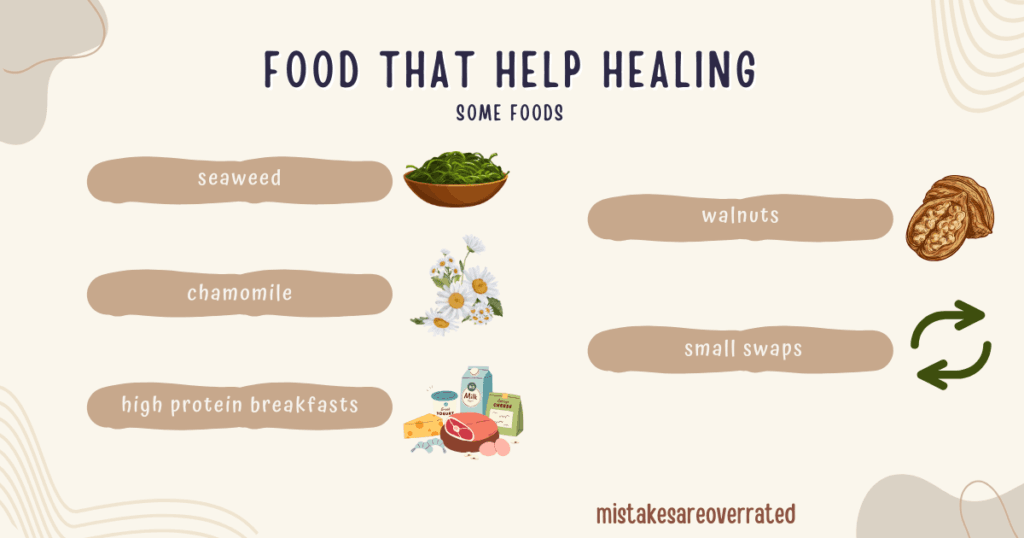
seaweed
seaweed is packed with essential nutrients for our bodies and is actually one of the most important detoxifying foods.
seaweed contains unique compounds that can help remove radioactive elements, free radicals and heavy metals from our body.
it can also help promote brain function, balance our hormones, reduce stress and inflammation and regulate our mood and energy levels.
not to mention it can aid in relaxation and help improve our sleep quality.
what types? wakame, nori, spirulina, kelp, dulse, arame, and chlorella
chamomile
chamomile can be amazing during our healing journeys when it comes to sleep and relaxation.
it contains a compound that can create gentle sedative effects that help soothe our nervous tension and reduce anxiety.
chamomile has been used to calm the mind which can help with trauma related symptoms such as insomnia, nightmares and anxiety.
how to use it? fresh or dried chamomile. dried in teas or fresh in salads, soups, smoothies, ect.
high protein breakfasts
food is such an important medicine and energy source for our mind, and when i began to eat breakfast, i noticed a huge difference.
i believe eating breakfast plays a vital role in positively impacting our mental health and trauma recovery.
eating breakfast enables us to replenish our brains energy source, (glucose), which i found kept me going throughout the day.
it also helps stabilise our blood sugar levels, enhance brain function and can improve our mood.
skipping breakfast can leave us feeling more sluggish and foggy minded or even have difficulty with concentrating.
walnuts
when i look at walnuts i cannot see anything other than a brain, so that must be nature telling us something.
walnuts are specifically good for our mental health and trauma recovery as they contain an essential amino acid.
this amino acids contributes to the production of serotonin, which can help with regulating our sleep, mood and even appetite.
how to use it? eat them plain, add them to yogurt, homemade granola, porridge, in smoothies or salads, ect.
small swaps
making small swaps in our life can be beneficial to our recovery and overall wellbeing and how we feel.
examples:
instead of a cadburys or hersheys hot chocolate -> use organic cacao powder and add some honey or raw organic sugar to it.
instead of adding the spice packets from the box or noodles -> just mix some of your own spices together.
instead of buying granola from the shops -> make it at home (it is actually so easy, and alot more versatile).
instead of buying bagels with 14 ingredients -> make 4 ingredient bagels at home
we just be more mindful of what we are putting into our bodies and all the extra unnecessary ingredients in every day used foods we consume.
diet and mental health recovery
these foods are technically not hidden from us, but they aren’t really spoken about or advertised to us either.
we only have one health in our lifetime, so we really need to take care of it – our bodies are truly amazing.
our nutrition is a powerful tool for our emotional recovery in our trauma healing journey.
i really have my mum to thank for all this knowledge i have around food, i grew up with her telling me all i know today.
i fell inlove with making my own food, not just because of the health and mental health benefits i found form it, but also the process of it.
i find it very therapeutic and a great activity for self care.
i know i am taking the time to hand make my own food to care for my body and health.
i also get to experiment and have fun with trying out new ingredients and recipes, (and surprise myself if it comes out well).
the food we consume can profoundly impact how our bodies process stress, how we feel, and how we recover mentally and emotionally.
i hope you got something out of this article today and you make your steps towards creating a healthier relationship with your foods.
professional help
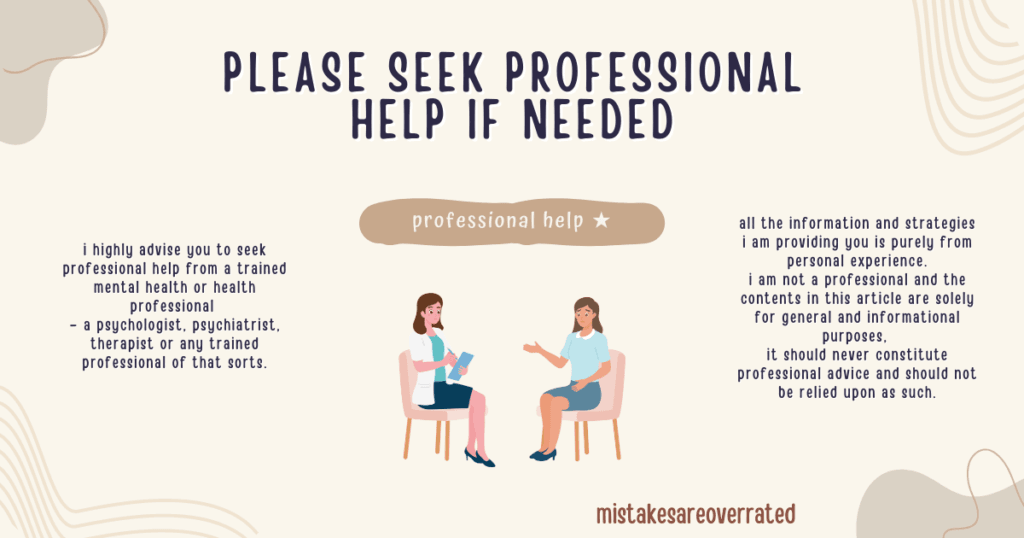
i highly advise you to seek professional help from a trained mental health or health professional
– a psychologist, psychiatrist, therapist or any trained professional of that sorts.
all of the information and strategies i am providing you with today is purely from personal experience and it should never constitute professional advice and should not be relied upon as such.
-mao
don’t give trauma the power to control you, you deserve to live how you want. take control of your trauma.
-life advice from one survivor to another

Leave a Reply